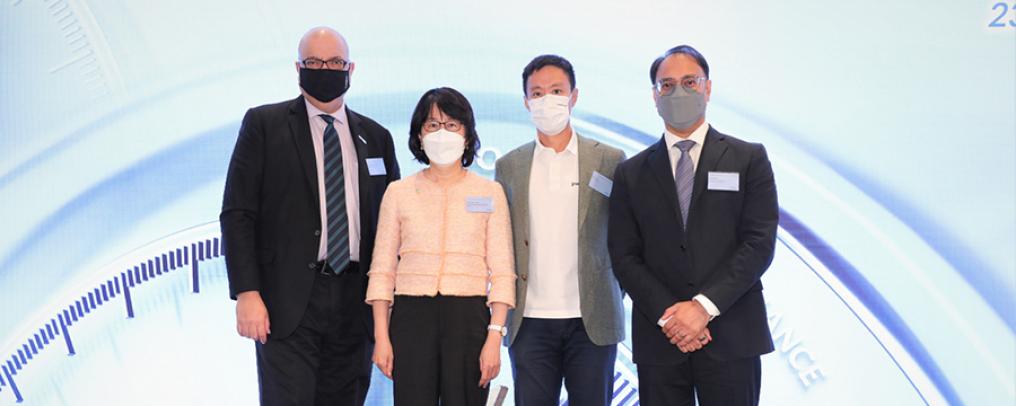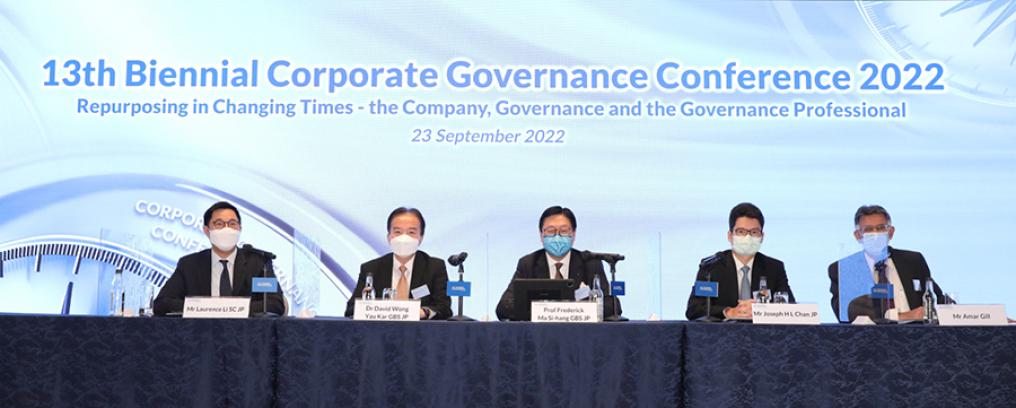Dr Kelvin Wong SBS JP, Chairman of the Accounting and Financial Reporting Council (AFRC), talks to CGj about the goals of the AFRC as the independent regulator of the accounting profession in Hong Kong.
Q: What was the primary purpose of launching Hong Kong’s new regulatory regime for the accounting profession on 1 October 2022, and what has changed?
‘The initial perception may be that not much has changed. If you compare the new legislation with the previous Professional Accountant’s Ordinance (PAO), there is no difference – the law, as of 1 October, will be the same as it used to be. It is as if the law has been carved out from the PAO and transferred into the Financial Reporting Council (Amendment) Ordinance.
This, however, does not reflect the intention and spirit of the reform, which is to ensure that the AFRC, as an independent regulator, will be the sole regulator of the whole accounting profession, not only of public interest entity (PIE) auditors. This includes all certified public accountants (CPAs) in Hong Kong. CPAs who wish to practise accounting by offering their services to the public, directly or through firms or companies, need to register with, and obtain their licences to practise from, the AFRC. The spirit of the reform was to earn public trust regarding the independence of the regulatory process.
The process of obtaining and renewing licences is vital. The AFRC may impose conditions in certain circumstances. Most applicants perform well, and for them only general conditions may be imposed during the licensing process. However, where we see gaps in competencies, or irregularities or misconduct, we may impose specific conditions on the licence applicant.
For example, we may impose additional CPD requirements on an individual or additional training programmes to address wider competency issues for a practice. We may impose a requirement for an independent monitoring report and/or a practising restriction if there are repeated irregularities or concerns about the adequacy of a firm’s resources. If there is repeated serious misconduct, we will not shy away from imposing the ultimate sanction, through our disciplinary function, which is exclusion from practising.
The power to regulate licences to practice allows us to consolidate the experience of our statutory functions at different levels.
The outputs from our inspection, investigation and discipline functions are inputs to our licensing work. They enable us to consider whether licensed practitioners have the competence, ethics and resources to practice to the high standards expected of them and, if not, to impose specific conditions. They need to be fit and proper.
Ongoing training is also important for accountants to maintain the skills they need to practice in an increasingly complex and changing operating environment. We will work closely with the Hong Kong Institute of Certified Public Accountants (HKICPA) to ensure that its CPD programme is adequate/enough to maintain the competitiveness of practising accountants in the current environment.’
Q: How do the reforms redefine the ambits of responsibility between the AFRC and the HKICPA?
‘Rewinding the clock back to 2019, the AFRC was purely an investigator – we had no inspection or disciplinary powers. We received complaints from the public and other regulators. We would investigate, prepare and deliver our reports to the HKICPA, which would follow up with its disciplinary process. Our international peers all had independent disciplinary powers. The perception of independence in the regulation of the accounting profession is critical to the confidence that users of financial reports have in the profession. The move to give us independent inspection and disciplinary powers over listed entity auditors in 2019 was a significant first step towards independent regulation of the accounting profession. One of the key reasons for the changes introduced by the government from 1 October this year was to further align Hong Kong with the independent regulatory regimes of other international financial centres. These changes ensure that, going forward, the whole accounting profession falls within our independent regulatory remit.
All complaints now come to the AFRC. We assess each complaint received and investigate each pursuable complaint. If appropriate, our investigators refer their report to the Department of Discipline, which assesses whether there is enough evidence for disciplinary action. Their recommendation is then put forward to the AFRC board, where we decide on imposing disciplinary sanctions.
We also inspect auditors’ internal quality controls and their audit working papers to assess the quality of their audits, whether the communications between the auditor and the audited entity’s management and board were robust enough, and whether all key management assumptions and judgements in preparing the financial statements were adequately tested and objectively evaluated by the auditor. We issued our second inspection report (2021 Annual Inspection Report) in June this year and big, medium, and small firms have all demonstrated improvement. So there is good evidence that firms are learning. Firms that consistently demonstrate appropriate professional scepticism and adherence to the standards will generally get the top rating of “1” for their engagement inspections. A rating of “2” is average, and “3” means there is a need for improvement. The inspection department will refer firms that get a rating of “4” for investigation.’
Q: What has been the impact of your whistleblowing policy launched in December 2021, and should companies tighten up their processes?
‘Public support of our work is essential, particularly the support of whistleblowers, who may have access to vital evidence of misconduct. We have already seen a more than doubling in whistleblower reports since we launched our policy in December 2021. Whistleblowers rely on the confidentiality of our whistleblowing system and it is important to ensure that members of the public in a position to blow the whistle understand that we will protect their identity. It is our duty to assess all complaints received, but the complaint must be legitimate if we are to pursue it. We make our decision to pursue based on the evidence provided to us. Therefore, a complaint based on personal motives that does not identify a legitimate irregularity, or does not provide objective grounds to investigate, would not be pursued.
We have been revamping our complaints platform on our website to ensure that complainants will find the process of filing a complaint straightforward. We have also recently released our complaint guidelines. The guidelines aim to share with the public general principles of an effective complaint – one that provides us with the information we need to pursue legitimate allegations of misconduct. For example, we will clarify that complainants need to be specific regarding their allegations and provide precise evidence that justifies further investigation. Without this, we may be unable to proceed further.’
Q: What questions should board members without accounting or auditing experience be asking to ensure they get all the relevant information on the financials and risks of the business?
‘It is a requirement for boards of listed entities to have at least one audit committee member with accounting qualifications or equivalent. The crucial question is whether that professional accountancy knowledge is sufficient to discharge their role as an audit committee member or chair. It is also important that audit committee members have adequate business knowledge and experience to understand the complexity of the business in the current economic environment.
Take, for example, accounting for expected credit losses. It relies on making credit risk assessments of the counterparties of your receivables. Customers are not homogenous; some are highly creditworthy, some less so. Directors will not be involved in the detailed assessments. To understand and appropriately challenge management’s conclusions and the work of their auditors, they will need to understand the key principles of the accounting requirements and how salient factors in the current environment, such as changes in interest rates, may be impacting the creditworthiness of their customers in different industries. This is complicated, but independent non-executive directors (INEDs) should be able to understand the relevant issues and identify relevant points on which to challenge management and their auditors.
The role of The Hong Kong Institute of Directors (HKIoD) is to ensure that company directors, including INEDs, are technically competent and updated. A minimum would be directors’ training, but this is only the beginning. The test is whether they can identify the issues, understand managers’ proposals and raise relevant issues.
In Hong Kong, the Companies Ordinance establishes directors’ duties on two levels. All directors must have a general understanding of accounting principles to perform their general duties. If they are an accountant by training, there are higher expectations of their duty and, if there is a problem with the accounts, they would be subject to harsher disciplinary action.’
Q: Do you have any advice for governance professionals?
‘I believe that members of HKCGI are pivotal as they are partners in the quality financial reporting process. Over the past two decades, stakeholders including company secretaries, INEDs, and internal and external auditors have been important to internal control and effective governance in Hong Kong. Still, they are not as well respected as they should be. They are all in charge of oversight and assume significant public interest responsibility, but listed companies generally have not instilled the necessary culture that is conducive to promoting the effectiveness of their functions.
For example, I have had mixed experience with internal auditors when chairing audit committee meetings. The internal auditor would sit next to the CEO and, when I ask for the audit plan for the next three years ranked by risk level, he or she will peep at the CEO as if seeking affirmation of whether to answer my question or not.
And who is the external auditor serving? There is an inherent contradiction in expecting auditors employed by a company to be independent of their paymaster in exercising their function. They are faced with an inherent dilemma between upholding the public interest while bearing in mind that both they and the company they are auditing are seeking to make profit. Only on rare occasions might they believe that the client is a culprit. They may know it is right to challenge the company’s management or board, or to become a whistleblower, but if they succumb to self-interest, they may choose to be submissive and absorb more risk.
As for INEDs, we have both lazy directors and busy directors, of which I think the former is the worse. If you are too busy, you may sometimes not draw good conclusions, but if you are lazy, you may bring no value in any circumstances. It is important for listed companies to have competent and responsible INEDs to perform the oversight function effectively.
Listed companies should foster a good culture of giving enough respect to company secretaries, INEDs and internal and external auditors. How can we nurture such a culture? Even after decades of observation, I am still in search of the most effective way to do so.’
Q: As Chairman of the AFRC, you have been an integral part of the new regulatory regime for the accounting profession. What led you to this crucial government appointment?
‘My full-time work has been with COSCO, a shipping group listed in Hong Kong since 1994. Along with my business career, I developed a desire to serve the community. My experience has been in business, finance, capital markets and corporate governance. In 1996, I became a member of the HKIoD, which promotes good corporate governance among listed entities, and I served as the HKIoD Chairman between 2007 and 2013. Gradually I developed a keen interest in how corporate governance is practised in different contexts and platforms. I have tried to walk the talk by ensuring that my company has a reliable internal control system of corporate governance that inspires trust and confidence.
I spent a lot of time engaging with the HKIoD, including training. Our pet project was the Directors of the Year Award, where we select practising directors who have demonstrated a track record of promoting corporate governance.
I have also served on the Listing Committee of The Stock Exchange of Hong Kong for six years, during which time I assessed IPO applications and proposed new policies and listing rules, which may further strengthen the corporate governance regime of listed entities and help promote Hong Kong as an international financial centre.
These were part-time public services. I then moved to the Securities and Futures Commission, serving as an INED for another six years. We implemented measures to ensure licensees and brokers are held responsible for performing and discharging their duties. The launch of the Manager in Charge regime, for example, meant that we could go after the licensee if there was anything wrong with the licensee. They would need to surrender the names, the hierarchy and the reporting accountability. This was a new approach to regulating brokerage industries and the investment community.
With the AFRC, I served initially as Council member and was appointed Chairman in December 2018.’
Sharan Gill
Sharan Gill is a lawyer and writer based in Hong Kong.



